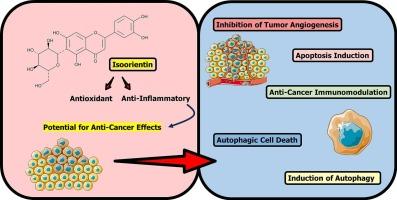Isoorientin: Unveiling the hidden flavonoid's promise in combating cancer development and progression – A comprehensive review
IF 5.2
2区 医学
Q1 MEDICINE, RESEARCH & EXPERIMENTAL
引用次数: 0
Abstract
Cancer remains one of the leading causes of mortality worldwide, characterized by uncontrolled cell growth and the ability of tumors to invade surrounding tissues and spread to distant organs. Despite significant advancements in early detection, diagnosis, and treatment, many cancers still present substantial challenges due to their heterogeneity, resistance to conventional therapies, and severe side effects of existing treatments. Consequently, there is an ongoing need for novel therapeutic agents to selectively target cancer cells, enhance the efficacy of current treatments, and minimize adverse effects. Isoorientin (ISO) is a naturally occurring flavonoid known for its anticancer properties. ISO has demonstrated the ability to influence several critical processes in cancer progression, such as cell proliferation, apoptosis, and metastasis. Due to the absence of clinical trials, we included only in vitro studies, reviewing 13 investigations. These studies covered diverse cancer types, including lung, brain, oral, liver, pancreatic, and gastric cancers, and assessed various outcomes related to cell viability, apoptosis, migration, and molecular pathway modulation. By synthesizing data from these investigations, our review seeks to provide a thorough understanding of ISO's anticancer effects, its mechanisms of action, and its potential as a therapeutic agent.

求助全文
约1分钟内获得全文
求助全文
来源期刊

Life sciences
医学-药学
CiteScore
12.20
自引率
1.60%
发文量
841
审稿时长
6 months
期刊介绍:
Life Sciences is an international journal publishing articles that emphasize the molecular, cellular, and functional basis of therapy. The journal emphasizes the understanding of mechanism that is relevant to all aspects of human disease and translation to patients. All articles are rigorously reviewed.
The Journal favors publication of full-length papers where modern scientific technologies are used to explain molecular, cellular and physiological mechanisms. Articles that merely report observations are rarely accepted. Recommendations from the Declaration of Helsinki or NIH guidelines for care and use of laboratory animals must be adhered to. Articles should be written at a level accessible to readers who are non-specialists in the topic of the article themselves, but who are interested in the research. The Journal welcomes reviews on topics of wide interest to investigators in the life sciences. We particularly encourage submission of brief, focused reviews containing high-quality artwork and require the use of mechanistic summary diagrams.
 求助内容:
求助内容: 应助结果提醒方式:
应助结果提醒方式:


